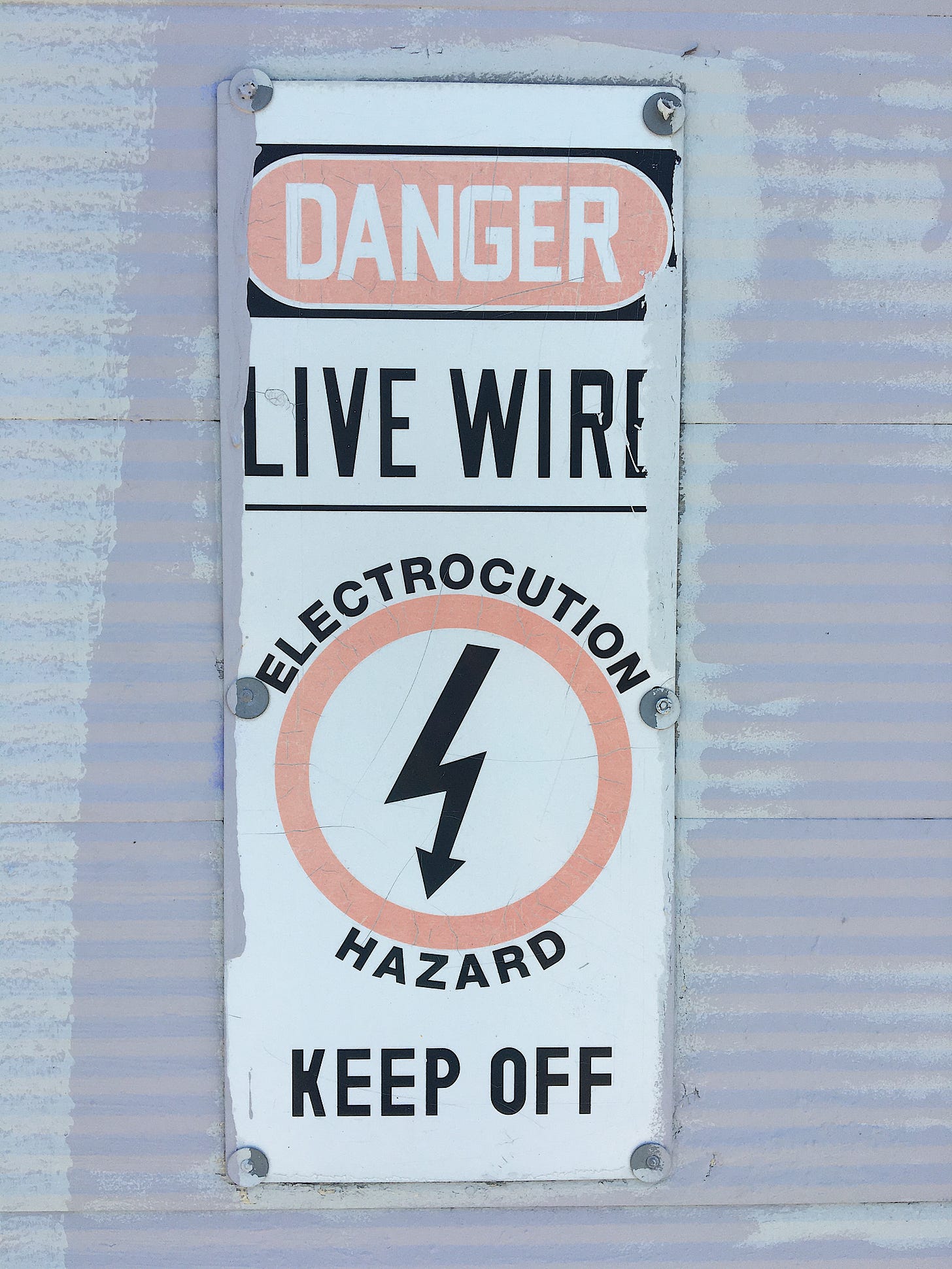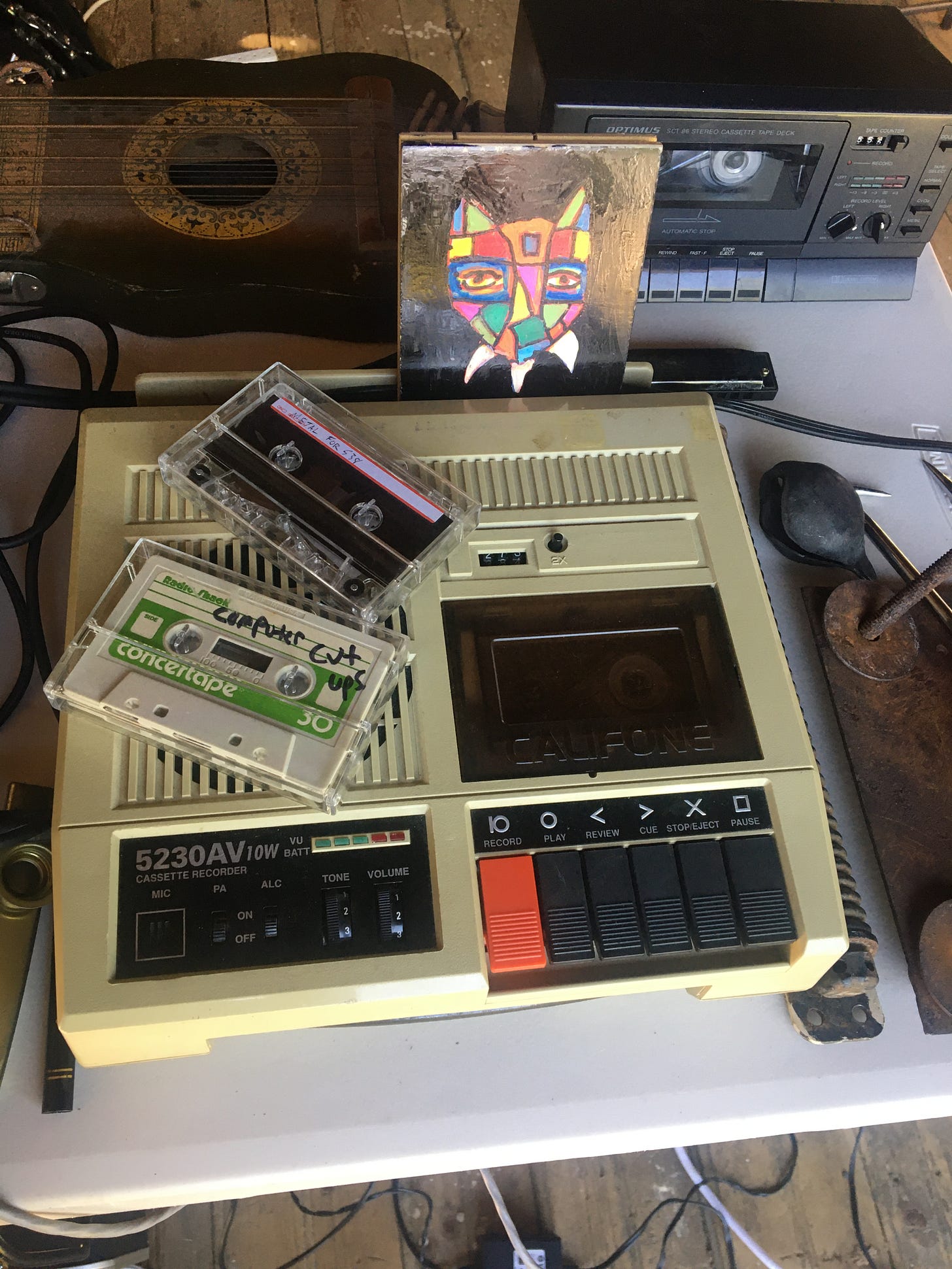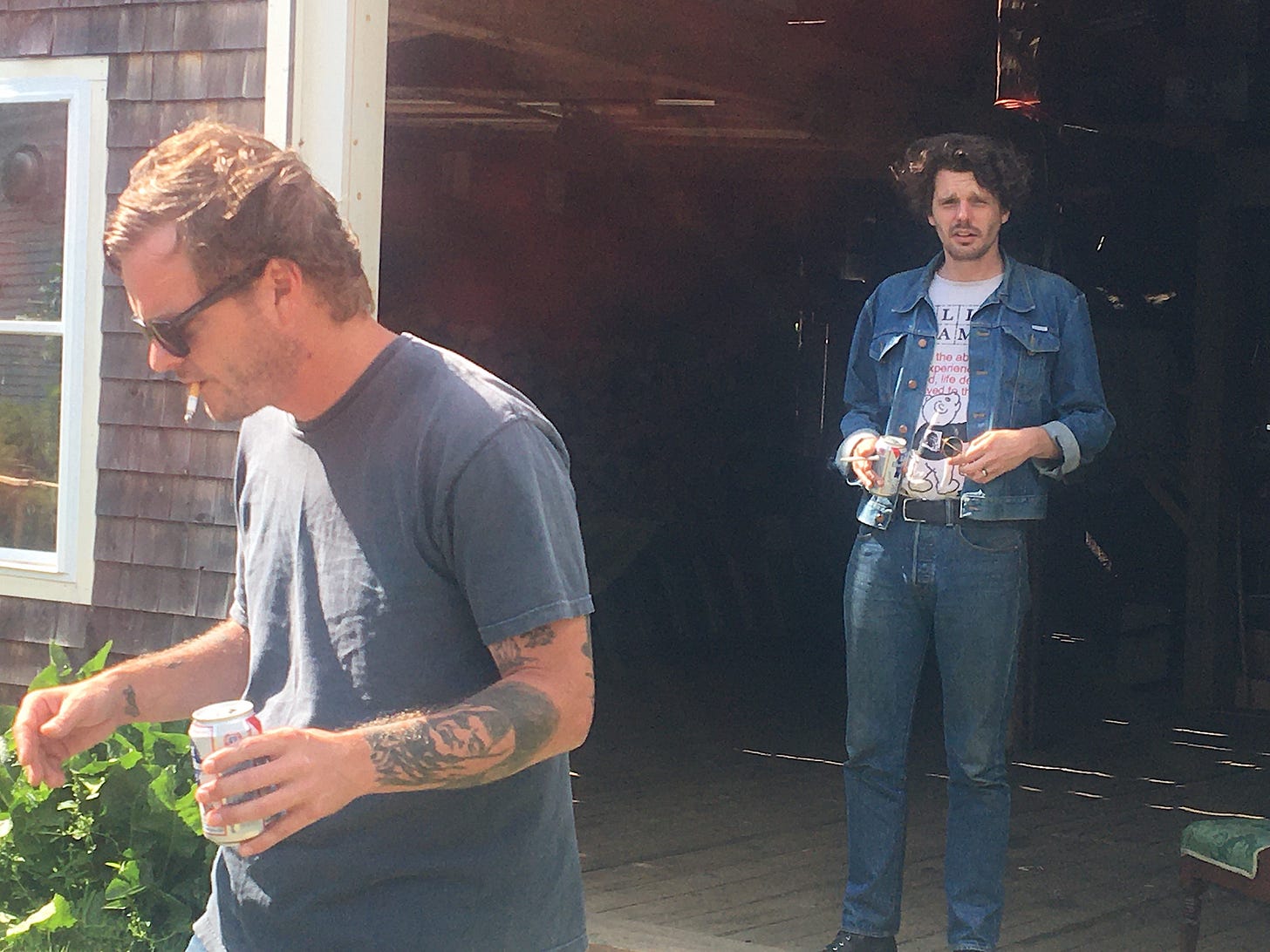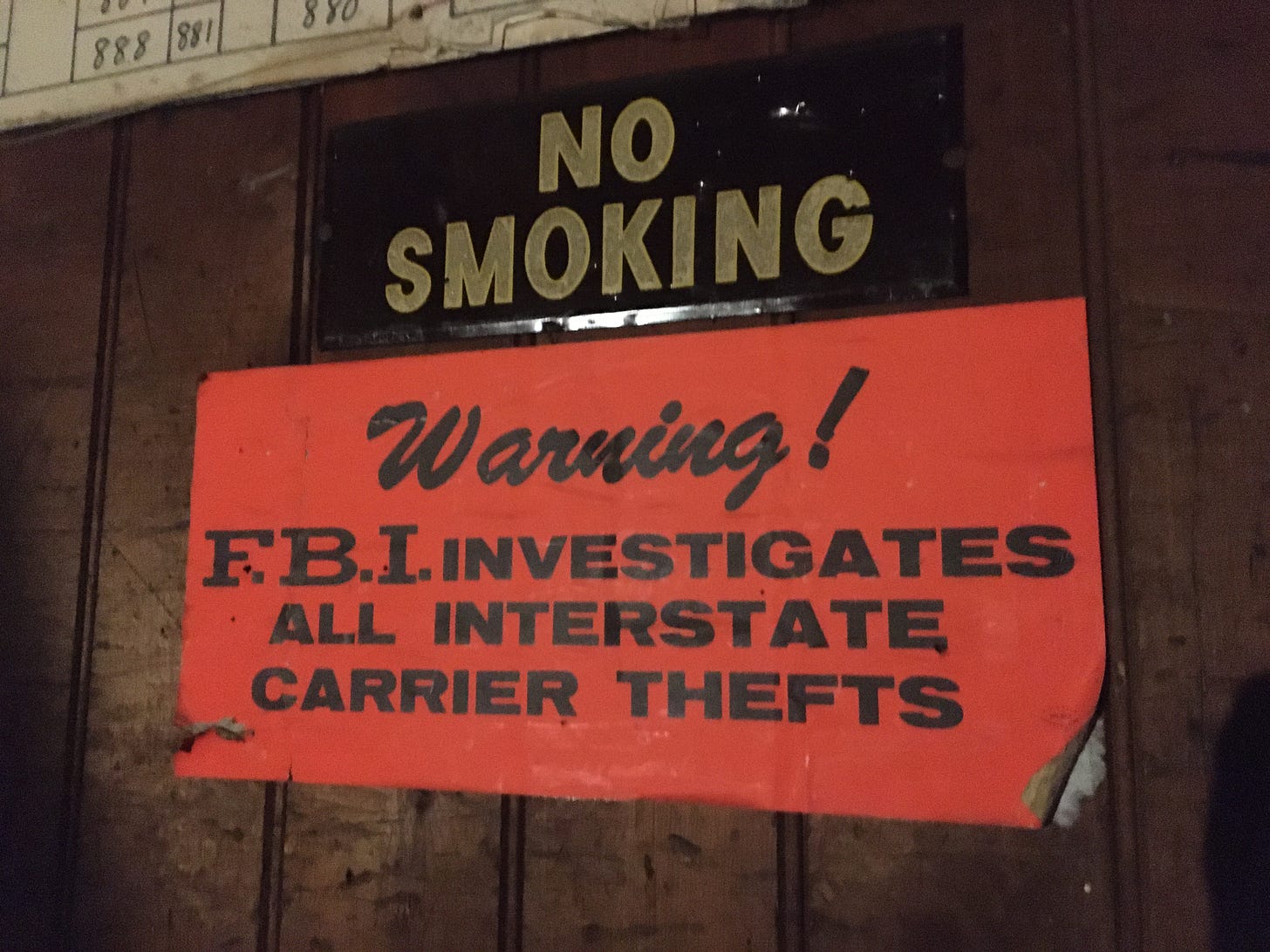I went on tour with Crazy Doberman in the summer of 2022, with an agreement to write it up for MAGGOT BRAIN Magazine. So I did. Then things went a little sideways and it didn’t come out in the issue it was supposed to (Winter 2022/23). It eventually came out in the following issue, Spring 2023 (MB #12). The piece covers 7 or 8 pages in the magazine and features a bunch of cell phone photos I took. Now, here, for the first time, it’s available in the digital realm. Copies of the magazine are still available here.
The sounds seep out of the speakers like a cadre of ghosts let loose upon the living. A haunted atmosphere that cannot be waved away—this is psychedelic music to burrow further into, in an attempt to come out the other side, transformed. Crazy Doberman, the many-headed beast, a gaggle of intrepid lifers that strives to reconnect the flexible membrane of the United States underground. Crazy Doberman is for the harsh-heads, free jazz diehards, damaged punks, field recordists, 21st century heshers, and cassette collectors—the full spectrum of the subterranean underclass. These folks are desperate for culture that evades the reflexive codification of its own aesthetics. We can blame the internet or we can give our attention to the select few making the effort to shed light on obscure paths.
Crazy Doberman hammers and wrenches at gesture until it becomes ritual, then plunges head-first into the unknown, buttressed only by instinct. Crazy Doberman exists in a state of flux—sometimes a wind-powered ensemble lashed together with scrap metal percussion, other times an eerily focussed duo effortlessly accessing the subliminal. During the lockdown era, the group maintained a consistent momentum. As they kept up a torrid recording pace and hosted barn shows on the outskirts of current home base Richmond, Virginia, the group mapped out regional tours and coordinated releases through in-house label Working Man Lay Down. Fast metabolism in evidence, Crazy Doberman is staking its claim as an essential American music collective.
Following years of open invitation recording sessions and live actions, Crazy Doberman has condensed into the core duo of Tim Gick and Drew Davis. As leader of the underappreciated death rock quartet TV Ghost, Gick has been a touring and recording musician since adolescence. Between releasing a series of impressive albums on In The Red and keeping up a steady touring regimen, TV Ghost went through the motions as well as any contemporary band. But Gick had become disillusioned with the music industry hamster wheel, even the independent iteration held little allure. He yearned for something to tear the straitjacket apart, something to channel his lifelong fascination with far-out sounds and underground culture.
In 2014, for its final bow in hometown Lafayette, Indiana, TV Ghost shared the stage with subterranean overlords Wolf Eyes. As Gick watched his friends in local noise unit Doberman open the show, he was struck by a moment of clarity—This is what I wanna be doing. First, he formed the Suicide-indebted Rev//Rev with members of Doberman, but it wasn’t until 2016 that the crew truly started to cohere. While employed as a bartender at Lafayette venue The Spot Tavern, Gick picked up a saxophone at owner (and sometime Crazy Doberman member) Paul Baldwin’s house. After blowing a tone and noodling around a bit, he felt compelled to play the sax with Doberman at an upcoming show. As fate would have it, Gick stepped into the line-up for Doberman’s final performance in that particular incarnation. A few months later, Wolf Eyes’ John Olson was back in town for a solo horn gig at The Spot. After Olson and Doberman performed improvised sets, they jammed together. A hyped Olson announced a new band on the spot. This wasn’t just Doberman, this was beyond Doberman, this was Crazy Doberman. Olson took the Lafayette contingent under his wing and spawned a new organism, ravenous and in need of nourishment. Like some Fagin of the Great Lakes, Olson taught these Dobermen the ways and means of self-sufficiency through industrious noise (aka #noiselife). For Gick, throwing off the shackles of song-based music-making was liberating and galvanizing. As for longtime punk Davis, a chance encounter in an Indianapolis parking lot resulted in the purchase of a pair of trumpets. Whatever course these two were traveling on had been corrected. Since they were employed at the same bar, the duo spent months woodshedding in pre-work blowing sessions. Davis and Gick came to a mutual understanding—if a worthwhile opportunity presented itself, they agreed to leave whatever stable situation in which they might find themselves. They wanted to play as much as possible, wherever and whenever that needed to happen. The journey was the adventure, and the adventure was the gig. Both Davis and Gick work labor jobs between tours, and they're willing to quit in order to strike out on the road. For this new gig as improvising musicians, they were learning as they proceeded, putting any foot forward, figuring it out later if it was the best one. The important thing was to take the step—once the stride begins it tends to follow itself, a perpetual motion machine.
Early Doberman efforts resulted in a torrent of shows and releases. 2017’s dense Free LSD LP put heads on notice—here was a group that was going in deep, no half-assing, no half-measures. The Crazy Doberman crew huddled together in cold Midwest living rooms, engaging in intimate skronk sessions with friends and acquaintances, using free improv as a shortcut to comradery and transcendence in equal doses. Establishing a connection to community courtesy of obliteration of the individual self, a kind of self-fulfilling prophecy. A flurry of tapes followed on Working Man Lay Down and other small-run labels. But it was Crazy Doberman’s first Astral Spirits offering, 2020’s Illusory Expansion, that set the group on an upward trajectory. The cassette went through a series of pressings and was eventually cut to vinyl. A follow-up, “everyone is rolling down a hill,” arrived in 2021, and releases continue to appear, albeit at a slightly more measured rate.
Always on the clock, Gick and Davis think hard about process and its many implications. They might slam beers like late shift operators, but they drill down like floor managers on the details of how they construct their singular sound edifices. In his role as chief sonic architect, Gick is in charge of recording, editing, mixing and mastering. He mentions his desire “to have a conversation with history.” By this, Gick means the history of underground music; the reason they’re getting in the van, road-dogging towards an elusive nirvana. When quarantine hit, Crazy Doberman made the decision to forgo participating in live video streams and projects of that ilk. Some artists raised their profile via this method, but the duo decided to lean on what they do best—real world communication, in a shared space, with the steam rising. Through Olson, they learned crucial methods of operation. Always be active, he advised them. Make your own merch and make a lot of it. Gas money is important money. Play anywhere, anytime. Now it was time for a summer stint up the East Coast, hitting off-grid towns and overlooked scenes. Hauling a trunk of brand new Working Man Lay Down artifacts, Gick and Davis were looking to get in front of the people; dip a toe, take the temperature, ride the lightning.
In addition to the non-stop hustle and sweat they channel into the project, Crazy Doberman are low-key experts in social media signal-boosting. Davis runs the ‘gram account and he has established a presence on the platform that has a skewed, stoked consistency. He’s usually repping a new tape from a Doberman-adjacent player, or some overlooked noise classic or, more likely, anything Gibson Brothers-related. Followers of Crazy Doberman have the option of being merely informed, or fully immersed.
After a set of searing shows in Queens and Brooklyn, in which the duo was joined by brother-in-noise Kyle Flanagan, Connecticut was the next stop up the coast. At first blush, New London is a quaint town with more churches than streetlights. Two centuries ago, New London was a center of the whaling industry, but now the port is the domain of nuclear submarines, a source of potential catastrophe hidden within the idyllic surroundings. The show was at Warehouse 3, a converted barn which lay within sight of the police station. In spite of this, the bands delivered. Junk Orbit, featuring members of the Mountain Movers clan, hypnotized even as one of their brood—a child of no more than five years of age—added a pleasing amount of chaos to the set, randomly plonking Casio keys and hitting the lone drum. Solo guitarist Emily Robb unleashed a litany of six-string sermons and New London locals Slyne And The Family Stoned’s three guitar din recalled last century’s noise rock in a most satisfying manner. Playing a new, more structured set, Gick and Davis settled into the night air, speaking its language fluently in front of a small but attentive audience. The high ceilings echoed with the foundational elements of old America; the sound of machinery arising from a hundred-year slumber, possessed by uncanny clanging and waves of shivering motion. For thirty minutes a night, Crazy Doberman takes the crowd by the hand and leads them deeper into the factory. Crazy Doberman utilizes a toolbox of methods—tape loop, bowed cymbal, sax skronk, junk percussion, glossolalia, sampled beat, string rake, flute tweet, trumpet spit—and wields them like old masters. Genuine menace and sincere ache finds common ground. In Providence, at The Ridge, a punkhouse perched above a highway, with a bridge set to be erected mere feet from its backyard, the crowd milled about restlessly. In a cramped basement, with as many broken chairs as people, Crazy Doberman manages to mesmerize the gathered faithful. Even the shirtless dude chastising the crowd for neglecting to get a pit going during power electronics combo Problem Masturbator is down with Doberman’s vibe. That’s Providence in a clamshell—sleazy, but good-hearted.
The following night in New Haven, at the college town’s long-standing, volunteer-run free (snagged a dubbed Cecil Taylor tape) store Never Ending Books, yielded an intimate set to an appreciative crowd of younger freaks still gestating in their weirdness. Shows like this are access points for virgin ears. The gig was booked by the skilled and prolific contrabass player Nicholas Serrambana (he also moonlights in local psych rock heroes Shirese). Nicholas not only performed an intense set of solo improv, he screened his Air Above Mountains Autism Speaks, a short film that relished its barrage of jarring edits and juxtapositions.
The next stop is intriguing, and exotic: two days in Maine. Maine has a Belgrade, and a Belfast. A China, too. But Belfast is where the barn is waiting. In 2007, Ro-He-Ge was established as a living art space by Amy Moon along with Dan Beckman of Impractical Cockpit (the top of the infamous Cockpit tour machine is still visible under a decade-plus of green vegetation). Now, Ro-He-Ge is run by the Psychic Sounds collective. Psychic Sounds’ activities encompasses booking shows, running a record label, programming a radio show, operating a silkscreening facility and installing site-specific art pieces. But the real showstopper is the barn itself, a 170 year-old behemoth with a ceiling that reaches towards the stars. And when you’re that far up the coast—a short stroll from the Atlantic along with a dearth of artificial urban light—you can see a lot of stars. It was a glorious sight, all of the statewide weirdos, from learning-to-walk children to seen–it-all heads, converging on this wild space for an old-fashioned hootenanny. Two days and nights of home-cooked meals, greenery to get lost in, camper vans to bunk in and onlookers to listen. Such a generous spread will do wonders for any touring group’s disposition. There can be no doubt, Crazy Doberman has established itself as the premiere barn band of the Eastern Seaboard. After the late night bonfires and ubiquitous experimental music, it was hard to disengage from the secluded Shangri-La that is Ro-He-Ge, but the rest of the tour beckoned. My final night with the Dobermen was at Tubby’s, in Kingston, just a few hours north of New York City. Over the course of a few years, Tubby’s has become a rare destination gig in an unexpected locale. Run by Cory Plump of Spray Paint and Rider/Horse, Tubby’s is one of the few venues in the United States that is analogous to the European show experience. Not only is there grub for a hungry band, but nearby accommodations (with an accompanying Korg MS-20, natch). In a heartbeat, and with a cold beer, Tubby’s will set you at ease and, thus, anxiety-free, Crazy Doberman raised the spirits for me one more time.
During that brief span when summer turns to fall, Gick and Davis completed a few more weeks traversing the belly of the country—Upper South, Midwest, Cloud Belt. On a parallel track, they formed harsh noise wrecking crew Demon Life with the inimitable Rodger Stella of Macronympha. This combustible mix resulted in yet another whirlwind of touring and recording.
Furious reinvention remains the constant. Looking backward to paths not taken, wandering off-road to lesser-seen lands, carrying necessary water to bone-dry communities. There’s a dirt road in your imagination that terminates at a ramshackle structure where Crazy Doberman is setting up to play. You can see them moving on the back of your eyelids and you can hear them in the wind at night.











